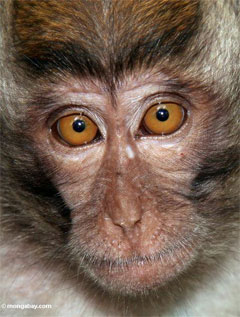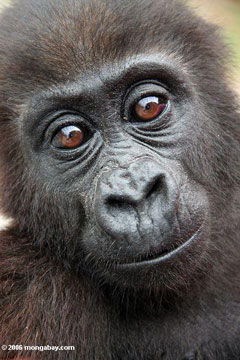Monkey trials for medical research should continue in Britain says report
Monkey trials for medical research should continue in Britain says report
Moving experiments abroad could worsen conditions for test subjects
mongabay.com
December 13, 2006
British scientists support the use of primates in medical research to improve human health and reduce deaths from disease but only if no alternatives are available according to a report by the Academy of Medical Sciences. The report, which examines the scientific basis for recent, current and future use of non-human primates in biological and medical research, comes as a poll by the journal Nature reveals that most researchers have “no ethical misgivings about the role of animals in their work.”
“There is a scientific case for careful, meticulously regulated non-human primate research, at least in the foreseeable future, provided it is the only way of solving important scientific or medical questions and high standards of welfare are maintained,” said Sir David Weatherall, lead author of the report, in a statement released Tuesday.
  Robert Bailey, professor of epidemiology and biostatistics, School of Public Health, University of Illinois at Chicago. Photo: Roberta Dupuis-Devlin/UIC Photo Services. |
The report says that primates are needed to “address particular research questions related to the immune, nervous and reproductive systems”, particularly for “treatments of brain diseases such as Alzheimer’s or Parkinson’s disease and vaccines for infections such as HIV.” Research in non-human primates offers the only way to ensure that therapies are “safe and effective” before they are tested in humans.
“It is estimated that there is funding available for only about 10 major HIV, tuberculosis and malaria vaccine trials in the next 10 years. These trials can take 5 years and involve 10,000 volunteers. Pre-testing in a small number of non-human primates can ensure we only proceed into human trials with vaccines that are likely to prevent millions of people dying of these diseases,” added Weatherall.
The report estimate that the total number of non-human primates used each year in British research is around 3,300. Most of these are used for testing of new drugs, while around 450 are used in academic research.
Weatherall says that pressure from animal rights’ groups may end up worsening conditions for animal test subjects by forcing experiments to go overseas where they will be unregulated.
“There are concerns that high costs, a shortage of animals and harassment by activists are forcing scientists to pursue non-human primate research overseas, where we have no control over animal welfare,” he warned. “This requires urgent investigation on the part of the government and relevant funding bodies.”
Separately an online poll of 1,682 Nature researchers found widespread support for the use of animals in research but scientists also revealed that “pressures from the animal rights movement and others makes it difficult to voice opinions in public.”
This article is based on a news release from thr Academy of Medical Sciences.